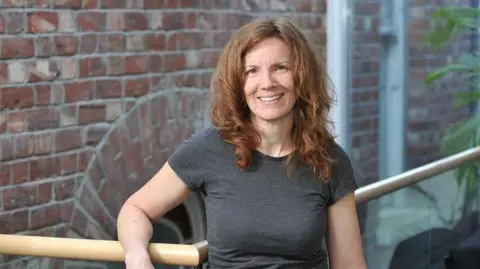Should children at nursery have screen time?
 Clare Evans
Clare EvansToddlers having screen time is a controversial topic among many parents.
The World Health Organization (WHO) recommends that children under five spend no more than one hour a day looking at a screen.
Whether it is a Ms Rachel video, an episode of Peppa Pig or a literacy or numeracy activity, the issue divides children, parents and educators.
BBC News NI has spoken to three people who work with young children to find out their views.
Regular screen time
 Getty Images
Getty ImagesAt St Teresa's Nursery School in west Belfast, children have access to screen time on a regular basis.
Its principal, Clare Evans, believes using digital technology will enhance children's learning, but must be safe.
"We had a wee boy who came in who was very, very passive," Clare told BBC News NI.
"He was shy, reluctant to make eye contact and he found it difficult to engage with the activities, even though we had lots of sensory things. Through digital learning, he started to thrive.
"We were able to present things to him in a way in which he understood."
Nursery staff used a tablet to play farm animal sounds, display QR codes for him to scan and created an interactive whiteboard to demonstrate his understanding of numbers and letters.
"It isn't about children sitting watching Peppa Pig or whatever all day, it's about providing multiple means of engagement for the children and seeing how we can make adjustments to encourage them to learn and develop, not focusing on deficits."
Digital inclusion
In west Belfast, nursery schools have been working together to identify trends nurseries are experiencing with how ready children are for school.
Ms Evans said after Covid-19 more children have been coming into school with a "lack of readiness" for their age.
"We have so many more children coming in with nappies on, not speaking, dummies, not able to jump on two feet, things like that.
"It's a combination of factors: people in the house more, a lack of social interaction, stress levels are high and it is particularly prevalent among families who are living in poverty."
The nursery schools have identified three key areas which need improvement: engagement, communication and regulation.
"We are seeing massive improvements among pupils in these areas, through the use of digital technology," said Clare.
 Aaron Ferguson
Aaron FergusonNo tablets or TVs
At Petite Feet, a private day nursery in Newtownabbey, Country Antrim, tablets and TVs are not part of the daily agenda.
Owner Aaron Ferguson told BBC News NI that staff "are actually quite proud of the fact that when you leave your child to our nursery they don't have access to screens".
"There probably are some positives to using screens but, for us, we don't feel that at this age - under five - they need any more of it than they are already exposed to outside of nursery," he said.
Screen-free zone
"We try to get the children outside as much as we can, we love music and movement, playing with Play-Doh, things like that."
He stated the day can be busy and there isn't time for digital tech.
"I don't really see the point in putting your child in childcare where there are highly trained staff and so many other amazing resources around you and they're just put in front of a screen.
"I understand that screens can be used as educational tools... but at an early age, for us, it's about interacting with peers, adults, getting a feel for things and physically doing stuff together."
 Queen's University Belfast
Queen's University BelfastDiscussion needed
Prof Karen Winter from Queen's University Belfast co-authored the UK-wide Toddlers, Tech and Talk project, led by Prof Rosie Flewitt from Manchester Metropolitan University.
It considered how children from birth to the age of three engage with digital technologies.
"There are different parental views as to the purpose of nurseries and the role of staff within them," said Prof Winter.
She added that nurseries have varied approaches to digital tech, some include it as a part of a child's daily routine, with music from Alexa or tablets to search for information on objects, colours etc.
Prof Winter said it is "increasingly common" for certain settings to use "digital documentation apps" as a way to document children's learning.
"The differences in approach are all understandable given the young age of the children," she added.
Prof Winter said there are "benefits" to children having access to digital technology and there are benefits against it.
She added the approach to digital use should be a discussion between the nursery and parents.
